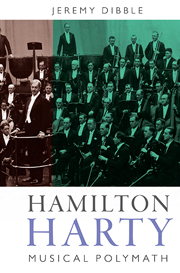Book contents
- Frontmatter
- Dedication
- Contents
- List of Illustrations
- List of Music Examples
- Preface
- Abbreviations
- Epigraph
- 1 1879–1901 Hillsborough, Belfast and Dublin: A Musical Apprenticeship
- 2 1901–9 London (1): A Pre-eminent ‘Collaborator’ and Aspiring Composer
- 3 1909–14 London (2): Composer and Conductor
- 4 1914–20 The War Years and After
- 5 1920–27 The Hallé Years
- 6 1927–33 Apogee: From Hallé to the LSO
- 7 1933–6 America and Australia: An Unforeseen Romance
- 8 1936–41 The Last Years: The Children of Lir – A Creative Codicil
- APPENDIX 1 List of Works
- APPENDIX 2 List of Recordings
- Bibliography
- Index of Harty's Works
- General Index
- Music in Britain, 1600–2000
4 - 1914–20 The War Years and After
Published online by Cambridge University Press: 05 December 2013
- Frontmatter
- Dedication
- Contents
- List of Illustrations
- List of Music Examples
- Preface
- Abbreviations
- Epigraph
- 1 1879–1901 Hillsborough, Belfast and Dublin: A Musical Apprenticeship
- 2 1901–9 London (1): A Pre-eminent ‘Collaborator’ and Aspiring Composer
- 3 1909–14 London (2): Composer and Conductor
- 4 1914–20 The War Years and After
- 5 1920–27 The Hallé Years
- 6 1927–33 Apogee: From Hallé to the LSO
- 7 1933–6 America and Australia: An Unforeseen Romance
- 8 1936–41 The Last Years: The Children of Lir – A Creative Codicil
- APPENDIX 1 List of Works
- APPENDIX 2 List of Recordings
- Bibliography
- Index of Harty's Works
- General Index
- Music in Britain, 1600–2000
Summary
With the outbreak of war, Harty, like so many other active musicians, gave time to charitable concerts for the YMCA, the Belgian Relief Fund and the Red Cross. This replaced, to some extent, a decline in his professional work as an accompanist. Fortunately engagements for orchestral concerts continued to be buoyant. In Manchester, major changes in musical personnel had arisen because of hostilities. Michael Balling, the Hallé Orchestra's permanent conductor, had gone to Bavaria after the Westmorland Festival for rehearsals at Bayreuth, and was at Partenkirchen when war was announced. Gustav Behrens, a prominent member of the Hallé's Board of Management, knew that it would be impossible for Balling to return. In order to assist the orchestra a host of conductors – Beecham, Verbrugghen, Safonov, Cowen, Ronald, Bantock, Elgar and Harty – offered their services (some without honorarium), which meant that the Hallé Concerts, the Promenade Concerts and the Gentlemen's Concerts were all able to able to announce ‘business as usual’.
Harty appeared at the Promenade Concerts in October and November and caught the eye of Samuel Langford, a particularly incisive critic for the Manchester Guardian:
A certain liveliness is characteristic of the concerts given under Mr Hamilton Harty's conductorship. It is not that he lacks in any way the control or repose of style necessary for fine interpretations; on the contrary, he possesses these qualities in a supreme degree, and his readings have the plasticity of the true creative musician. But he has warmth, and likes liveliness for its own sake.
- Type
- Chapter
- Information
- Hamilton HartyMusical Polymath, pp. 117 - 142Publisher: Boydell & BrewerPrint publication year: 2013



